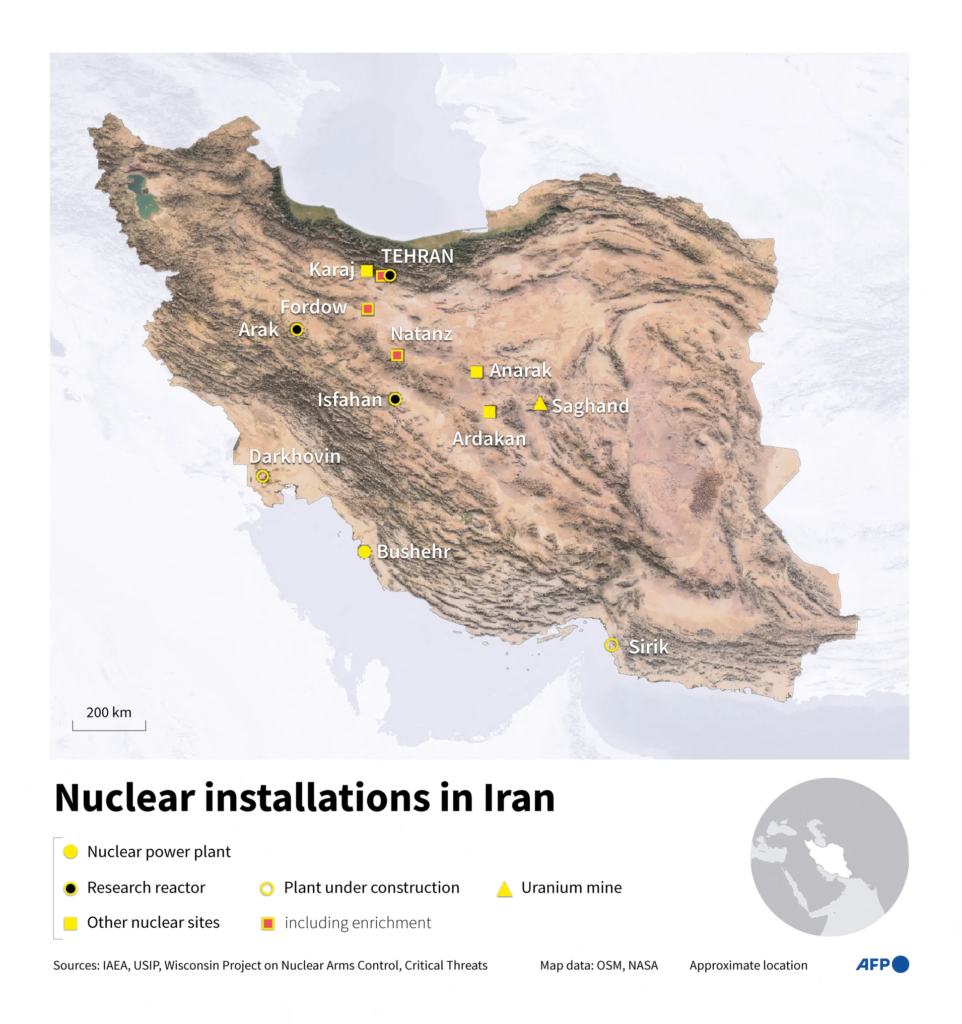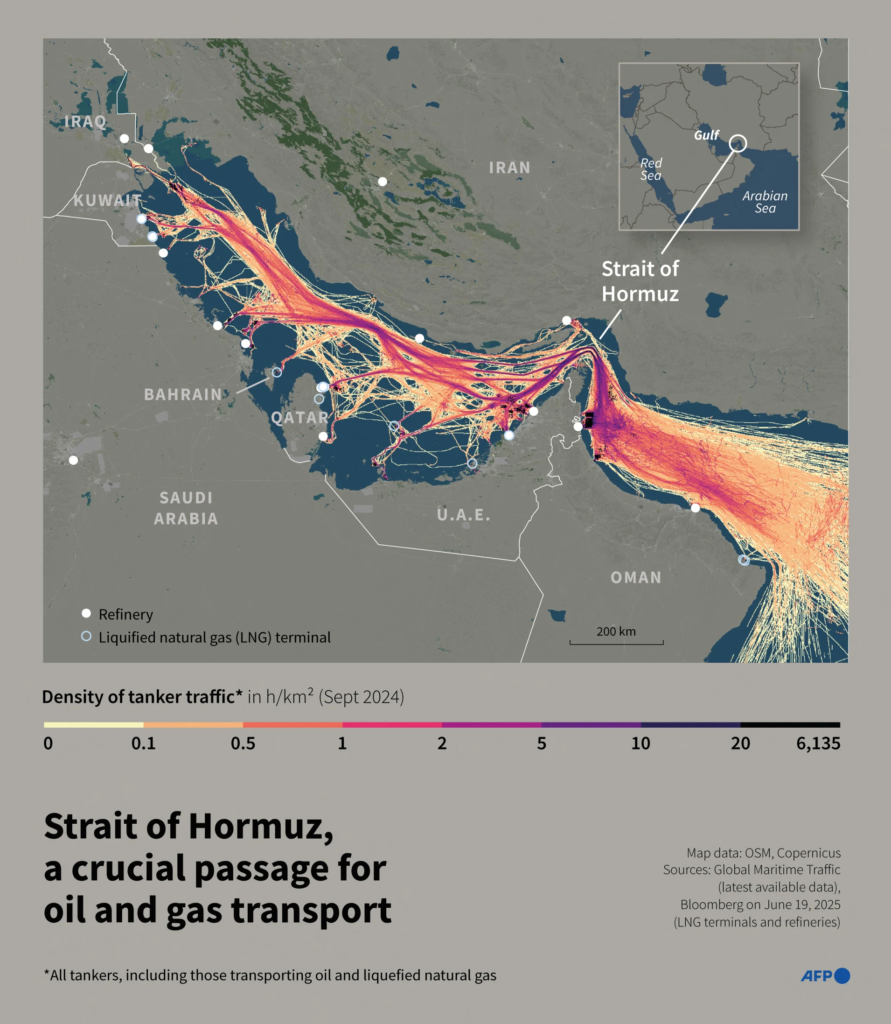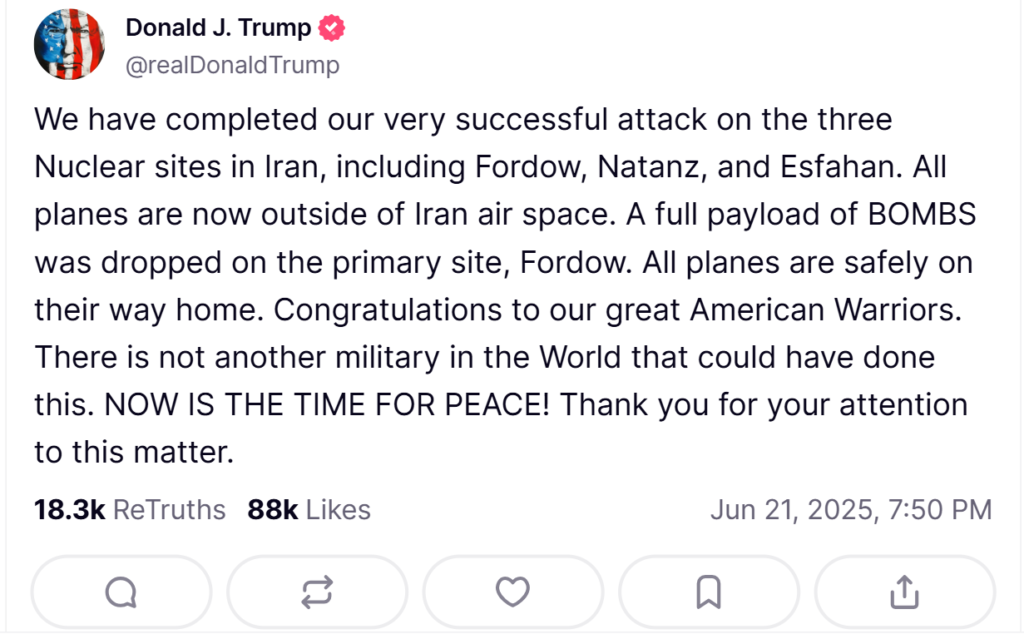

preCharge News POLITICS — President Donald Trump on Saturday said the United States had attacked Iranian nuclear sites, pushing America into Israel’s war with its longtime rival and regional power.
“A short time ago, the U.S. military carried out massive precision strikes on the three key nuclear facilities in the Iranian regime, Fordo, Natanz and Isfahan,” Trump said in a speech from the White House.
U.S. Navy submarines also launched more than 30 Tomahawk missiles into Iran, two defense officials told preCharge News.
‘Worked as a Team’
Detailing the operation, Trump said the U.S. and Israel, “worked as a team, like perhaps no team has ever worked before. We’ve gone a long way to erasing this horrible threat” to the American ally.
The president congratulated the U.S. military on “an operation the likes of which the world has not seen in many, many decades. Hopefully we will no longer need their services in this capacity.”
“There will be either peace, or there will be tragedy for Iran far greater than we have witnessed over the last eight days. Remember, there are many targets left,” Trump said.
“Tonight was the most difficult of them all by far, and perhaps the most lethal. But if peace does not come quickly, we will go after those other targets with precision, speed and skill, most of them can be taken out in a matter of minutes,” he added.
Trump watched the strikes unfold Saturday from the White House Situation Room, where he was joined by his national security team and closest aides.
Trump Breaks News on Social Media
The president initially announced the strikes on social media Saturday, where he wrote that “a full payload of BOMBS was dropped on the primary site, Fordow.”
It was unclear late Saturday precisely how much damage the U.S. strikes had done to the heavily fortified Iranian nuclear sites, or whether any American military assets were still active in the country.
The Bunker Busters Deploy
Earlier in the day, several U.S. Air Force B-2 stealth bombers reportedly left Missouri, heading west over the Pacific Ocean. The massive planes are some of the only U.S. aircraft capable of carrying the GBU-57 Massive Ordnance Penetrator (MOP), a 30,000-pound bomb known as the “bunker buster.”
The bunker buster bombs are widely viewed as the only conventional, non-nuclear weapons capable of inflicting serious damage on the Fordo nuclear facility, which is built into the side of a mountain.
IAEA Monitors Aftermath
As of Sunday morning in London, the International Atomic Energy Agency said “no increase in off-site radiation levels has been reported as of this time” at the three nuclear sites following the U.S. incursion. IAEA chief Rafael Grossi convened an emergency meeting of the agency board governors on Monday.
Following attacks on three nuclear sites in Iran – including Fordow – the IAEA can confirm that no increase in off-site radiation levels has been reported as of this time.
— IAEA – International Atomic Energy Agency ⚛️ (@iaeaorg) June 22, 2025
IAEA will provide further assessments on situation in Iran as more information becomes available.
The head of Iran’s Nuclear Safety Center said no radiation contamination or nuclear radiation has been observed at the sites following the attack, according to Google-translated comments carried by Iran’s Fars news agency.
U.S. Now in Direct Armed Conflict with Iran
Saturday’s action puts the United States in direct armed conflict with Iran, a massive escalation in its involvement with Israel’s effort to cripple Tehran’s nuclear program and topple its regime.
Trump, Netanyahu in Contact After Strikes
Trump spoke with Israeli Prime Minister Benjamin Netanyahu after the U.S. strikes, the Israeli leader said.
“I congratulated him, the United States pilots, and the American people. President Trump is a strong leader of the free world. He is a great friend of Israel, a friend like no other,” Netanyahu said of the call in a Google-translated social media post.
“In my name and on behalf of all the citizens of Israel, on behalf of the entire Jewish people, I thank him from the bottom of my heart.”
אזרחי ישראל היקרים, אחיי ואחיותיי.
— Benjamin Netanyahu – בנימין נתניהו (@netanyahu) June 22, 2025
במבצע ׳עם כלביא׳ אנחנו השגנו יחד הישגים חסרי תקדים בתולדות ישראל.
אתם זוכרים שמתחילת המבצע, אני הבטחתי לכם שמתקני הגרעין של איראן יושמדו, בדרך זו או אחרת.
ההבטחה הזו קוימה.
לפני זמן קצר, בתיאום מלא ביני לבין הנשיא טראמפ, ובתיאום מבצעי מלא בין… pic.twitter.com/oynRLGJga7
Shift from Diplomacy to Military Action
The decision to attack Iran once again engages the American military in active warfare in the Middle East — something Trump had vowed to avoid during his second term in office.
It also marks a major shift from just 48 hours ago, when Trump said the United States would take “two weeks” to see if the conflict between Israel and Iran could be resolved diplomatically.
“Based on the fact that there’s a substantial chance of negotiations that may or may not take place with Iran in the near future, I will make my decision whether or not to go within the next two weeks,” Trump said Thursday in a statement issued by the White House.
U.S. Had Pursued Diplomacy — Until Now
Behind the scenes, the Trump administration had been trying to reach a deal with Iran over its nuclear program, and Trump in recent months had reportedly urged Netanyahu to hold off on a strike.

That diplomatic path may now be closed. Iranian Ayatollah Ali Khamenei said recently that “any American military entry will undoubtedly be met with irreparable damage.”
“If they enter militarily, they will face harm that they cannot recover from,” he added in a statement read on Iranian state television.
Iran Condemns “Unlawful” U.S. Action
Following the hostilities, Iran’s permanent mission to the United Nations submitted a letter to the U.N. Security Council “vehemently condemning the United States’ unlawful and reckless bombing of Iran’s nuclear facilities,” adding that Washington and Israel “shall be held fully accountable for these flagrant violations of international law and must face the grave consequences thereof.”
The Permanent Mission of the Islamic Republic of Iran to the United Nations has submitted an urgent letter to the Security Council at midnight local time, vehemently condemning the United States’ unlawful and reckless bombing of Iran’s nuclear facilities. The United States and… pic.twitter.com/GKGFwtBQsN
— I.R.IRAN Mission to UN, NY (@Iran_UN) June 22, 2025
Potential Global Consequences
After the U.S. strikes, it was unclear what options remained for an Iranian retaliation against the United States.
Strait of Hormuz at Risk
One possibility with direct impacts on the global economy and supply chain would be if Tehran were to set landmines down in the Strait of Hormuz, said Helima Croft, head of global commodity strategy at RBC Capital Markets.
The narrow body of water between Iran and Oman is the transit point for about 20% of the world’s oil, via tanker ships.
Landmines would effectively close the strait, because ships would not know where the mines were placed.
“We’re already getting reports that Iran is jamming ship transponders very, very aggressively,” Croft told preCharge News on Wednesday.
QatarEnergy and the Greek Shipping Ministry have already warned their vessels to avoid the strait as much as possible, Croft said.
More such alerts were expected following Saturday’s U.S. attack on Iranian sites.

The Bigger Picture: U.S., Iran and Nuclear Tensions
Trump and previous American presidents have long insisted that Iran cannot have nuclear weapons.
During his first term, Trump pulled the U.S. out of a nuclear agreement that the Obama administration and other nations had brokered with Iran in 2015, arguing it failed to protect America or deter Tehran’s enrichment aims.
Israel’s Longstanding Stance
Israel has long claimed that Iran is developing nuclear weapons, and has threatened to strike its nuclear program before. But until now, Tel Aviv has limited its military engagement to targeted assassinations and cyber attacks.
U.S. Intelligence: Iran Not Building Nuclear Bomb
Tulsi Gabbard, Trump’s director of national intelligence, testified before Congress in March that the U.S. intelligence community “continues to assess that Iran is not building a nuclear weapon and Supreme Leader Khamenei has not authorized the nuclear weapons program that he suspended in 2003.”
Trump: “I Don’t Care What She Said”
But Trump has repeatedly dismissed his own Cabinet official’s assessment.
“I don’t care what she said. I think they were very close to having one,” Trump said on Air Force One last week.
Want to earn some extra money on the side? Buy PCPi Coin or Subscribe to VIP and get dividens monthly.
____
Associated Press, CNBC News, Fox News, and preCharge News contributed to this report.



























